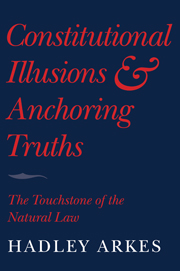Book contents
- Frontmatter
- Contents
- Acknowledgments
- INTRODUCTION: The Anchoring Common Sense and the Puzzles of the Law
- ONE On the Novelties of an Old Constitution: Settled Principles and Unsettling Surprises
- TWO The Natural Law – Again, Ever
- THREE Lochner and the Cast of Our Law
- FOUR The Strange Case of Prior Restraint: The Pentagon Papers
- FIVE Near Revisited
- SIX The Saga of Frank Snepp and the New Regime of Previous Restraints
- SEVEN And Yet…A Good Word on Behalf of the Legal Positivists
- EIGHT Conclusion and Afterword
- Index
INTRODUCTION: The Anchoring Common Sense and the Puzzles of the Law
Published online by Cambridge University Press: 05 June 2012
- Frontmatter
- Contents
- Acknowledgments
- INTRODUCTION: The Anchoring Common Sense and the Puzzles of the Law
- ONE On the Novelties of an Old Constitution: Settled Principles and Unsettling Surprises
- TWO The Natural Law – Again, Ever
- THREE Lochner and the Cast of Our Law
- FOUR The Strange Case of Prior Restraint: The Pentagon Papers
- FIVE Near Revisited
- SIX The Saga of Frank Snepp and the New Regime of Previous Restraints
- SEVEN And Yet…A Good Word on Behalf of the Legal Positivists
- EIGHT Conclusion and Afterword
- Index
Summary
It might have been struck off in Verona. Or at least, that was the first inference likely to spring to mind, for the statute sounded as though it had been drafted in response to Romeo and Juliet, that it had been framed in contemplation of a city riven by small wars, with factions and families set off against one another. It smacked, that is, of a place “where civil blood makes civil hands unclean.” And indeed, it had come from a city in Italy in the late Renaissance – in the fifteenth century – but it was from Bologna, and it decreed “that whoever drew blood in the streets should be punished with the utmost severity.” Blackstone had noted the case in his Commentaries on the Laws of England, and he reported the judgment, reached after a long debate, that the statute was “not to extend to the surgeon, who opened the vein of a person that fell down in the street with a fit.” That the question should arise at all is a kind of testament to the enduring credulity of human beings – or the powerful need many people have to follow the rigid letter of the law rather than seek counsel in their own judgment, not guided by anything set down in the law.
For many people that diffidence may reflect a proper doubt about their own resources of judgment when left unguided or uninstructed.
- Type
- Chapter
- Information
- Constitutional Illusions and Anchoring TruthsThe Touchstone of the Natural Law, pp. 1 - 12Publisher: Cambridge University PressPrint publication year: 2010



